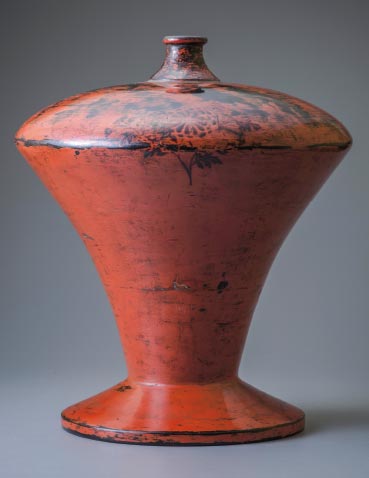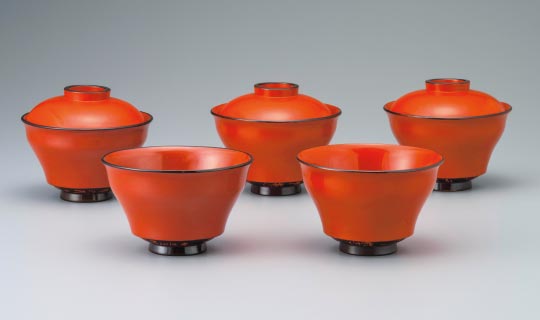
D. 27.0 cm, H. 32.5 cm
Private Collection
Private Collection
Heishi refer to ritual bottles for offering sake to the Shinto
deities and were originally placed in front of the deities as a
pair. Today, most of these lacquered vessels have been dispersed in
various collections. One of the highlights in this exhibition will
be to feature this original form of pairing these ritual bottles.
The heishi here, unfortunately, exists as a single unit. However, its bold appearance and majestic presence are incomparable to any other. Its shape with an outward curve from its spout and an inward facing curve towards its base that are clearly demarcated at the shoulder demonstrates a strong Japanese style even among the extant examples of heishi.
The heishi here, unfortunately, exists as a single unit. However, its bold appearance and majestic presence are incomparable to any other. Its shape with an outward curve from its spout and an inward facing curve towards its base that are clearly demarcated at the shoulder demonstrates a strong Japanese style even among the extant examples of heishi.
The bowls at the front left and
back left are inscribed with the characters meitoku (“bright
virtue”).
Although all the bowls come with lids, the lids for the two front bowls were removed for the photograph.
Japan, dated Meitoku 2 (1391) and Tenpo 5 (1834)
Two Meitoku bowls: D. 11.5 cm, H. 7.1 cm
Three Tenpo bowls: D. 11.3 cm, H. 7.2 cm
Jimyō-in Temple, Mount Kōya, Wakayama Prefecture
Although all the bowls come with lids, the lids for the two front bowls were removed for the photograph.
Japan, dated Meitoku 2 (1391) and Tenpo 5 (1834)
Two Meitoku bowls: D. 11.5 cm, H. 7.1 cm
Three Tenpo bowls: D. 11.3 cm, H. 7.2 cm
Jimyō-in Temple, Mount Kōya, Wakayama Prefecture
These wooden tenmoku bowls with wide rims and narrow bases are
unusual for having dates inscribed on their bases. Until recently,
only one bowl belonging to the Tokyo National Museum was known. With
the cooperation of the Reihōkan Treasury on Mount Kōya, two bowls
were newly discovered. Interestingly, the Edo-period Kyoto lacquer
artisan Sano Chōkan (1794–1856) made three of the five bowls to
supplement the two bowls dated Meitoku 2 (1391) and added lids to
the set, which came to be used to serve Japanese sweets.
Chōkan may have refinished the Meitoku bowls since the red shade of all five bowls match. This set represents an important example that reveals that these dishes, which were made in the likeness of tenmoku tea bowls, were reused in the Edo period.
Chōkan may have refinished the Meitoku bowls since the red shade of all five bowls match. This set represents an important example that reveals that these dishes, which were made in the likeness of tenmoku tea bowls, were reused in the Edo period.

(*Works will be rotated during the exhibition.)